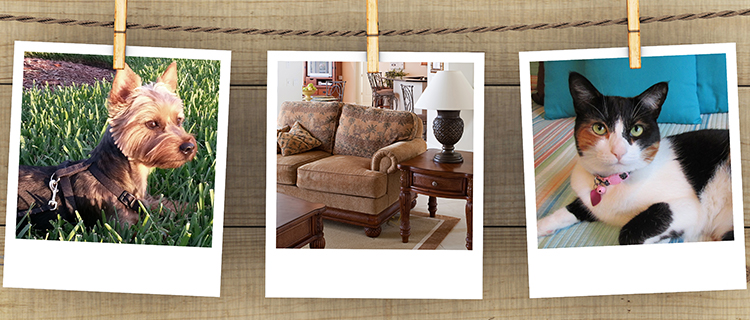WELCOME BACK, as we conclude our 5-Part series on Pet Proofing Your Home… Safety is paramount in a pet friendly home and it is our job to carve out a safe haven for our 4-legged furry friends, both inside and out.
Hazards in the Great Outdoors
- Open doors and windows are great for letting in fresh air but not when they tempt your pets out into the scary world of cars and other dangers. Balconies may seem safe but it is very easy for small pets to slip through the railings or get stuck halfway.
- Be sure that if Fido or Tiger do find their way outdoors, they will be heading into a safe place such as a fenced yard.
- Plants and pets aren’t always a perfect combination. A surprising number of plants, including landscape and houseplant favorites, are toxic and even lethal if your furry friend decides to take a nibble. Some of the most common plants that should be kept away from your pets include: lily of the valley, oleander, azalea, yew, foxglove, sago palms, hibiscus and hydrangea, aloe, bird of paradise, to name a few.
- Talk to your Vet or follow this link to the ASPCA website for a very comprehensive list of plants that are toxic to cats and dogs.
- Outdoor garden supplies, such as compost, cocoa-based mulches, pesticides, insecticides and fertilizers can all cause problems for pets. Your first line of defense is keeping such things stored away safely and out of reach.
- Traditional snail and slug bait is also toxic. If you need to keep your vegetables and other plants safe from these garden marauders, look for other barrier methods or pet friendly bait formulations.
- Chemicals are an obvious source of trouble if pets drink from pools or spas. Even if pets can swim, they can still drown in pools and spas, if they can’t get out by themselves. Long, low steps may help but your best approach is to keep your furry friends away from the water, either with covers or fencing or by keeping them inside, unless accompanied.
- Ponds also pose a problem as they are prone to forming algae which may be toxic.
- Just as fireplaces can be a danger indoors, ashes and flames from fire pits and BBQ’s can be another outdoor hazard.
WHAT TO DO IF YOUR PET IS POISONED?
Don’t wait! Call your Vet or the ASPCA Animal Poison Control Center at 888-426-4435. Time is critical for successfully treating accidental poisoning. Be prepared to state your dog or cat’s breed, age, weight and any symptoms. Have the product container or plant sample nearby to assist with identification so the appropriate treatment recommendations can be made.
We hope you found this post to be helpful, informative and interesting… Watch for our next BLOG POST on October 20th as we look at the year-over-year comparison of single-family housing market trends in Hernando County.
To learn more about Tampa Bay area homes for sale in Spring Hill and Brooksville, located in Hernando County, Florida, explore our state-of-the-art, MLS Map Search Feature. Our MLS Map Search Feature makes it easy for BUYERS to search and find MLS listings and for SELLERS to find out what the competition is doing! And, for even more valuable BUYER and SELLER resources, visit www.GailSellsFloridaHomes.com today!
Until then… it’s all about YOU!

